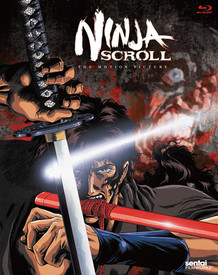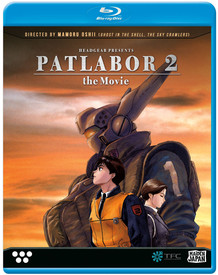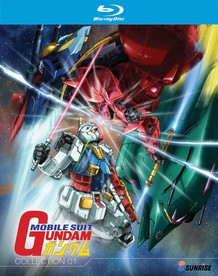The Shelf Life Year in Review
by Paul Jensen,
With only a few days left in 2015, I thought it'd be good to take a short break from the usual format in order to look back on what's been a very eventful year for Shelf Life. Rather than trying to produce a definitive top 10 list for the year, I've gone through the archives and picked out some of the more interesting titles that we've reviewed over the past twelve months. Some represent recent trends in the industry, others coincide with significant changes to this column itself, a few sparked some lively debates, and the rest simply stood out in my mind as good or memorable shows. If anything here leaves you yearning to learn more, each title links to that show's full Shelf Life review. Enjoy!
January
The first thing that caught my eye in January was Bamboo's review of the original Bubblegum Crisis, which made a return to the US market through a successful crowdfunding campaign. That backstory behind the release stood out to me, since it shows that audience support can play a big role in keeping older but well-liked titles around. The series itself is noteworthy as a time capsule for 1980s cyberpunk anime, especially with its character designs and hand-drawn animation. Bamboo also had a lot of praise for the collection itself, noting that "it should be immediately obvious that this video set is a labor of pure love." Chalk this one up as a win for fans of older anime, delivered by a funding and production process that's still relatively new.
An honorable mention for January goes to the first half of Muv-Luv Alternative: Total Eclipse, though not necessarily because of the show's quality. The reason I'm including this ambitiously dark but ultimately average mecha series is because it's the first thing I ever reviewed for Shelf Life. That particular review went out on January 26th, which means I've been working on Shelf Life in one capacity or another for eleven months now. Time flies when you're marathoning a different anime series every week.
February
 Love, Chunibyo & Other Delusions!
Love, Chunibyo & Other Delusions!
I've reviewed quite a few good shows for Shelf Life, and Love, Chunibyo & Other Delusions is definitely near the top of that list. It strikes an excellent balance between humor and emotional depth as it explores that awkward part of life where our youthful fantasies are asked to step aside and make room for the real world. The strong writing and acting are backed up by top-tier animation, which helps bring the characters' embellished visions of reality to life. The collector's edition that I reviewed is also a good example of the recent wave of big boxes that we've seen from companies that had previously focused on low-priced releases. Companies with smaller catalogs have been playing successfully to the premium market for a while now, but 2015 saw some more of the big names follow suit. If you've got plenty of disposable income sitting around, it's a pretty good time to be an anime collector.
February also brought a review of the first Space Brothers collection. I have no idea how popular this show is with fans in general, but it's certainly gotten a lot of well-deserved love here on ANN since it came out in 2012. It's a great series, and it's also pretty accessible to people who don't normally watch much anime. Go check it out, and then show it to your family members who think anime is just for angsty teenagers.
March
Having anime fans review Genshiken is kind of like shooting fish in a barrel; of course we're going to like a show that's about us. This franchise has been around for quite a while now, and it's always been good at depicting the current state of anime fandom. The characters feel very human, and it's not hard to find someone to relate to among the large cast of otaku. That sense of connection, along with a surplus of references to other series, helps keep the show's humor fresh and lively. As Bamboo explained in her review, this most recent season also includes some more ambitious writing, and that stronger dramatic effort pays off nicely. Genshiken is tailor-made for its target audience, but it's also a good series on its own merit.
March also saw the arrival of another member of the current Shelf Life crew, with Gabriella stepping in to replace Lynzee. Gabriella started off with a review of Gingitsune, which is a solid slice of life series with some interesting spiritual elements. In addition to some very charming supernatural characters, Gingitsune features a little more character development than you'd normally see in a single-season title. It's certainly a heck of a lot better than the show I ended up watching for my first review.
April
I know Space Dandy has been covered in depth ever since it came out, but there's always room for a series with such an abundance of creative talent behind it. It's about as episodic as a show can get, which leaves the door open for all kinds of delightfully absurd ideas that would never fit into an ongoing plot. Bamboo described it as a "celebration of the animated medium" in her review, and I think that sums it up very well. Space Dandy is a fun reminder that one of the great things about animation is the way it allows creators to do things that would be absurdly expensive or downright impossible with live action. You can dive headfirst into all the subtle nuances of its more philosophical episodes, or you can just sit back and enjoy it as pure entertainment. Either way, it's a real blast.
Speaking of things that have gotten plenty of attention, April also included a review of Puella Magi Madoka Magica the Movie -Rebellion-. As the only movie in the trilogy that goes beyond the plot of the original TV series, Rebellion is easily the most hotly debated of the lot. Whether you see it as thoughtful or simply pandering, I can all but guarantee that it's at least given you something to talk about. And really, who doesn't enjoy a good ol' anime argument from time to time?
May
I described Bubblegum Crisis as a time capsule for a particular time and genre earlier in this article, and the same could be said of Ninja Scroll. It captures the part of 1990s anime that reveled in using fantastic animation to depict sex, violence, and gore in painstaking detail. Despite all its excesses, it's also a very good action film. Gabriella looked at the movie from a present-day perspective in her review, and I'm inclined to agree with the connections she drew between Ninja Scroll and modern titles like Kill la Kill and Redline. This is a movie that's worth preserving as an embodiment of a particular style, so I'm glad that it's stuck around over the years.
Since I haven't gotten a chance to talk about any of my own reviews in a little while, I'm going to abuse my authorial powers and include D-Frag! on this list as well. I have a tendency to confine gag comedies to the Rental category, so D-Frag! is notable for making the Shelf Worthy cut. It has a good grasp on fundamentals like timing and delivery, and it's also very good at the "escalating chaos" approach to humor. A show doesn't always have to be an instant classic to be Shelf Worthy; sometimes doing one thing very well is enough to merit a recommendation.
June
The anime world is populated by plenty of what I'm going to somewhat unkindly call Ghost in the Shell-alikes. Futuristic crime stories can be very compelling, but there are of so many of them that it takes something special for a new work to stand out. In the case of the Mardock Scramble films, "something special" is probably an understatement. These movies are weird and unsettling on multiple levels, but they manage to hold together and leave a strong impression. As Gabriella noted in her review, Mardock Scramble uses some plot devices and explores some thematic territory that could have caused a film with sloppier execution to fail spectacularly. If you enjoy the risk-taking, brain-exploding side of science fiction, this trilogy should be right up your alley.
Speaking of things that shouldn't work as well as they do, Devil Survivor 2: The Animation surprised me by being the rare video game adaptation that actually works as an anime series. A dark but well written story, a compelling ensemble cast, and a really cool ending theme are enough to make this show enjoyable even if you haven't played the game. Actually, "enjoyable" might be the wrong word for a series that doesn't hesitate to kill off likable characters on a regular basis. "Intense and gripping" might be more accurate.
July
Working with other writers on a column like Shelf Life is great, since it means that we can share the workload and bring multiple unique voices to the reviews. That second part is especially neat when someone else points out something in a review that I missed when I watched a show on my own. For example, Gabriella's review of Ping Pong helped me finally figure out why I like this series so much. It's a sports anime with a unique (and understandably divisive) visual style, but it's also just a damn good show. The story and characters are memorably good, and it uses a lot of clever tricks to fully immerse the viewer in the action. Ping Pong is the kind of show that works even if you're not normally a fan of the genre, and it's easy to get swept up in the story once you get used to its animation style.
Another thing I've learned while working on this column is that you can sometimes tell if you've touched a nerve just by looking at the number of comments. Shelf Life typically receives somewhere between 20 and 30 comments a week, but we got 60 on the installment that included a review of No Game, No Life. I stand by my decision to give it a Rental, but I also stand by my assertion that it's a creative and compelling series. Despite its flaws, it's fun and memorable enough to be worth watching if you somehow missed the tidal waves of buzz that accompanied both the simulcast and the collector's edition.
August
Most people who write regularly have at least a few words that they use way too often. One of my personal vices is using "refreshing" all the time when I'm talking about a good anime series. It's my catch-all adjective for shows that do something that's unusual within their genre and are better off as a result. My Little Monster earns that label by offering a frank and insightful look at all the awkward clumsiness that accompanies teenage romance. As Bamboo explained in her review, the lead characters are believably flawed yet very easy to like. The show feels more in touch with reality than many anime romances, with people acting like people instead of doing ridiculous things in order to move the story along. Think of it as a sharper, less sociable counterpart to My Love Story, which also meets my "refreshing" criteria.
My Little Monster was reviewed in the same week as Noragami, which seems to have earned itself quite a few fans. The show has a broad appeal, which has gotten less common as many new titles try to zero in on one specific audience or another. Gabriella's review featured comparisons to a number of big-name titles from the romance and action genres, and the genius of Noragami lies in its ability to successfully fuse the two into a single package.
September
Choosing the most important review for this month was an easy task, as September was when Bamboo wrapped up her Shelf Life tenure. Her review of Patlabor 2 does the film more justice than I'd be able to do here, so I'll use this space for a little personal backstory instead. I spent a long time reading Shelf Life before I ever wrote for it. This column was one of my primary sources of anime reviews when I was still new to the hobby, and it's not too much of a stretch to say that it played a role in shaping my tastes as an anime fan. I don't think I really started to grasp the significance of taking the helm until a week or two after I said yes to the job, but it's sunk in slowly over time. Watching anime is a weird and wonderful way to spend your time, and I'd like to think that I'm in a position to help people discover what makes this medium so much fun. As responsibilities go, that's a pretty exciting one to have.
We move on from that uplifting (or perhaps just cheesy) anecdote to the crankiest, most miserable series that I've ever fallen in love with: My Teen Romantic Comedy SNAFU. It's a show that's built specifically for snarky introverts like me, and its biting social observations will make you laugh right up until the moment it stabs you in the heart. It's not for everyone, but it works beautifully if you happen to see pieces of yourself in the main characters.
October
Gabriella took on an interesting challenge in October: watching a Gundam series for the first time and reviewing it for Shelf Life. Luckily, Turn A Gundam proved to be a pretty accessible way into one of anime's most storied franchises. It's a standalone series that doesn't demand much familiarity with the rest of the Gundam universe, and it's also pretty darn good. Gabriella's review pointed out that the show manages to succeed at the difficult task of presenting a big, sweeping narrative while remaining both fun and compelling. It also features an attractive art style, which makes it even easier to get wrapped up in the show's world. This review is also significant to the column as a whole, as it established Gabriella as our unofficial Gundam reviewer. I like the idea of having a review look at a big franchise from a newcomer's point of view, and I'm planning on doing some more of that in 2016. I don't want to give too much away, but it's possible that you'll see me review one or two pieces of a certain long-running action series.
One of my favorite October reviews was Windy Tales, and not just because it gave me an opportunity to make a fart joke in that week's column subtitle. This obscure little series took me completely by surprise with a unique look and a well-developed cast of characters. It's best described as a slice of life show with supernatural elements, but it takes advantage of its slow-paced plot in a way that few shoes in the genre manage to do. Instead of going through the usual list of high school events, Windy Tales just sort of does whatever it wants, using each episode as an opportunity to tell a weird and interesting story. If there's one thing you've probably noticed about me by now, it's that I like weird and interesting things.
November
This may sound a bit odd, but Tokyo Ghoul has at least one thing in common with Space Dandy. Both shows offer us anime critics a wealth of themes and ideas to write about, but they can also just be enjoyed as exciting and addicting pieces of entertainment. The two of them differ just a teeny tiny bit when it comes to tone, however. Tokyo Ghoul is a dark, dramatic horror story with some spectacular action thrown in for good measure. Gabriella had a lot to say about the story and characters, which is where we find all that complex thematic goodness that makes shows like this fun to write about. It's up to you if you want to analyze the series for yourself or just indulge in the bone-crunching drama, but Tokyo Ghoul is an easy recommendation either way.
November is also when the Shelf Life crew went back up to its current strength of three reviewers. James started with a review of Selector Infected Wixoss, which brings me to an interesting little factoid. The first Shelf Life reviews that the three of us wrote span the full rating spectrum: Gabriella's first show was Shelf Worthy, mine was a Rental, and James got a Perishable series. There's no great significance to that statistic, but it is a reminder that you get to watch all kinds of things in this job. Sometimes the review assignment gods are kind and benevolent, sometimes they're cruel and merciless, and sometimes they're just kind of "meh."
December
We saw some important titles return to the market in 2015, but Mobile Suit Gundam might be the most significant of the lot. After all, this is the Gundam show, the series that defined a genre despite going through all kinds of behind-the-scenes drama. You want to know where all your favorite giant robot shows are getting their ideas from? Watch this one. (And maybe also Neon Genesis Evangelion.) As Shelf Life's unofficial Gundam reviewer, Gabriella found that the original series holds up remarkably well thanks to a strong cast and the script's willingness to explore themes like the horrors of war. If there's one thing I've learned from this year's numerous rereleases of older titles, it's that good storytelling has a very long… shelf life.
Since it'd be downright criminal to end on that awful pun, I'll also call some attention to the new collector's edition of Black Lagoon. It may not have defined a genre like Mobile Suit Gundam, but this is still one heck of a series. It's fun, it looks good, it's got some inspired action scenes, and there's some deceptively clever writing hiding behind all the explosions. The over-the-top ammo box packaging may be a little silly, but it fits the show (and its contents) like a glove.
And with that, we close the book on 2015. Thanks to everyone for reading Shelf Life throughout this very busy year. I hope we were able to steer you all towards some good shows, and that you had some fun along the way. There's already plenty of exciting things on the horizon for next year, so be sure to stick around. We'll be back to business as usual next week, because anime waits for no one.
discuss this in the forum (13 posts) |










